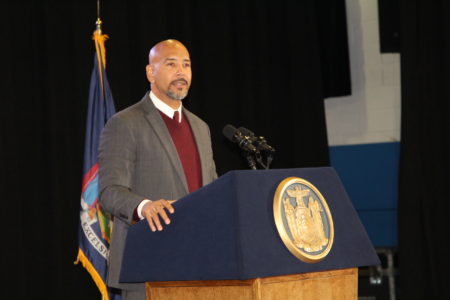The inflow of Honduran, Guatemalan, Salvadorian, and Mexican migrants seeking asylum in the U.S. screeched to a halt in the Spring of 2020 after a March 21 CDC order spearheaded by the Trump administration created a 30-day prohibition on all nonessential travel to the United States. The restriction effectively gave Customs and Border Protection officials the power and mandate to immediately turn away any and all immigrants crossing the border without documentation, suspending their usual practice of Credible Fear Screenings and other methods of taking the circumstances of individuals’ previous living conditions into account before making a final decision about their immigration status. These restrictions were extended indefinitely over the Summer of 2020, citing public health concerns relating to the pandemic— all while Trump himself pushed with greater and greater aggression for states to reopen their economies, assuring the public that the virus would rapidly recede into irrelevance.
This policy, a clear continuation of a series of movements on the administration’s part to shrink the annual refugee admissions ceiling that began less than a month into Trump’s presidency, effectively turned away over 20,000 migrants between March and May of 2020. According to a United States Citizenship and Immigration official, during this time period, only two migrants were permitted to remain in the United States to pursue asylum. As Charanya Krishnaswami, an advocacy director for Amnesty International, told reporters at the New York Times, “This ban was never about the pandemic, and it was never about public health… the Trump administration is weaponizing CoViD-19 to achieve the policy objective it has sought from Day 1: shutting the border to people seeking safety.”
Despite this looming hostility, the drive to immigrate to the U.S. remains strong. As The New Humanitarian reports, citizens of Honduras—one of the three countries forming the “Northern Triangle,” the source of a large share of Latin American immigrants seeking asylum in the U.S.—suffer from “widespread poverty, government corruption, and one of the highest rates of violence in the world outside a warzone.” However, these systemic pressures spiked in November after two back-to-back Category 4 hurricanes, Eta and Iota, devastated the country last month, exacerbating an ongoing climate crisis in the region. At the opposite extreme, perennial drought had been a catalyst of migration in the area for years, earning the region the title “the Dry Corridor.” As José Antonio Munguía, a 45-year-old Honduran father of two from the Sula Valley, told reporters, “Ever since Hurricanes Eta and Iota arrived, no form of aid has gotten to us… Now, we feel obliged to go north, because the poverty here is already so bad that there is no way we can survive. We already lived poorly. The harvests were just coming in when the hurricanes came and destroyed everything.”
As of January 2021, there remains no refuge to be found in the U.S. Under the new guidelines, migrants are being expelled faster than ever before, spending an average of 96 minutes on U.S. soil before being forced back out into the Sonoran desert with no resources and no transportation. Prior to the pandemic, 84% of decided claims from residents of the Northern Triangle and Mexico were denied, but as the pandemic wore on, the Trump administration’s restrictions became so extreme that entire refugee resettlement agencies began to collapse in the Summer of 2020 due to plummeting federal reimbursement for their depleted headcounts. According to the Center for American Progress, “the Trump administration’s deliberate attempts to bar refugees from entering the country and undercut the resettlement infrastructure has presented the greatest existential threat the U.S. refugee program has faced.” These curtailments continued throughout the final weeks of the Trump’s term; on December 10, 2020, the administration issued a final rule that further narrows asylum eligibility and makes it even more difficult for migrants to pass credible fear screenings, changes which officially took effect on Monday, January 11, 2021, a mere nine days before Biden’s inauguration.
This tidal wave of anti-immigrant enmity also extended to those with established roots on U.S. soil. The Coronavirus Aid, Relief, and Economic Security Act (CARES Act) denied federal tax rebates to anyone who filed tax returns without a “valid identification number” (practically, a Social Security Number). Those who did so likely used an Individual Taxpayer Identification Number (ITIN), and although filers of this type cough up more than $9 billion in withheld payroll taxes annually and contribute to the solvency of multiple federal programs, the act’s icy eligibility stipulations excludes them from receiving urgently needed financial relief.
Meanwhile, according to a ProPublica report, in May of 2019, the Army Corps of Engineers was awarded a pair of contracts worth $788 million to replace 83 miles of fence along the southwest border. Four months into 2020—two into the pandemic—the administration increased the value of the contracts by more than $1 billion, and by May, the value of the two contracts had more than tripled, to over $3 billion. In other words, taxpaying, mixed-status families, many of whom continue to face some of the most dire economic prospects of any group during the pandemic, were aggressively denied any form of federal financial aid, but were not even momentarily alleviated of their obligation to continue contributing to federal expenditures like the border wall.
We certainly would not want to waste precious, hard-earned dollars on frivolous, theatrical nonessentials while people’s well-being, safety, and prosperity are in jeopardy.
All hope is not lost, however. President-elect Biden has promised that “There will not be another foot of wall constructed on my administration, No. 1,” and his campaign website highlights his role as a “champion” of “the creation and expansion of the Deferred action for Childhood Arrivals (DACA) program.” In addition, Alejandro Mayorkas, a Cuban-born immigrant, director of U.S. Citizenship and Immigration Services during President Obama’s first term, and Biden’s incoming Director of Homeland Security, will be the first Latino man to hold his new position, an encouraging milestone for the future of Latin American immigrants and refugees to the United States. Biden’s pro-immigrant stance should prove to be good news for the thousands of migrants who have slept in tightly policed camps on the banks of the Rio Grande—if not the wilderness or the accommodations of a trafficking ring—and with efficient movement on the administration’s part, the promise etched in bronze on the pedestal of the Statue of Liberty to welcome the “tired, [poor], huddled masses” may soon come to fruition.








